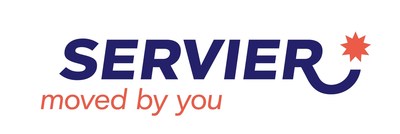Servier's New and Updated Data at 2025 ASH Annual Meeting Highlight Commitment to Hematology Research
- Presentations include seven company-sponsored abstracts and 11 investigator-initiated studies.
- Results from a Phase 1 analysis of TIBSOVO® (ivosidenib) in patients with newly diagnosed IDH1-mutated AML who are eligible for chemotherapy will be featured in an oral presentation.
BOSTON, Nov. 6, 2025 /PRNewswire/ -- Servier today announced that it will present new and updated data at the 67th Annual Meeting of the American Society of Hematology (ASH), December 6-9, 2025, in Orlando, Florida. Presentations will highlight clinical and real-world data from Servier's hematology portfolio and underscore Servier's leadership in isocitrate dehydrogenase (IDH) mutant acute myeloid leukemia (AML) and myelodysplastic syndromes (MDS).
Notably, Servier will present an updated response and safety analysis from a Phase 1 study of TIBSOVO® (ivosidenib) combined with intensive chemotherapy in newly diagnosed IDH1-mutated AML in an oral presentation on Monday, December 8 at 4:45 p.m. The data demonstrate the addition of TIBSOVO to intensive induction and consolidation chemotherapy followed by single-agent TIBSOVO maintenance produces long-term responses with an acceptable safety profile. The benefit of this frontline regimen is being assessed in a Phase 3 randomized, blinded trial.
"Servier's presentations at this year's ASH Annual Meeting reflect our ongoing commitment to maximizing the potential of the medicines in our portfolio, leaving no stone unturned as we endeavor to deliver innovative treatment options to as many eligible patients as possible, said Becky Martin, PhD, Chief of Medical, Servier Pharmaceuticals. "We're expanding our existing understanding of the clinical benefits of TIBSOVO to uncover its full potential in AML and MDS, while simultaneously advancing the research and development of investigational treatment options in our growing hematology pipeline."
A full list of abstracts can be found here.
Media contact
Darby Malkin: darby.malkin@servier.com
About Servier in Oncology
Servier is a global leader in oncology, governed by a non-profit foundation. Servier approaches innovation with a long-term vision, free of influence from fiduciary responsibilities.
Servier is the leader in IDH-mutant targeted therapies and devotes more than 65% of its research and development budget to Oncology. Servier aspires to advance more targeted therapies by identifying mutations and understanding how these mutations impact cancer and its progression. Servier believes we can serve more people by helping the right patients find the right treatment, at the right time.
Servier takes a One Innovation Engine approach to R&D and is actively seeking alliances, partnerships and acquisitions at various stages of the portfolio.
For more information about working with Servier to bring the promise of tomorrow to the patients it serves, visit Servier.us.
About Acute Myeloid Leukemia
Acute myeloid leukemia (AML) a cancer of blood and bone marrow characterized by rapid disease progression, is the most common acute leukemia affecting adults, with approximately 20,000 new cases in the U.S., and 43,000 cases in Europe each year.1,2 AML incidence significantly increases with age, and the median age of diagnosis is 69.1 The five-year survival rate is approximately 31.9%.1 For 6 to 10 percent of AML patients, the mutated IDH1 enzyme blocks normal blood stem cell differentiation, contributing to the genesis of acute leukemia.3
TIBSOVO IMPORTANT SAFETY INFORMATION AND INDICATION FOR U.S. PATIENTS
INDICATIONS
TIBSOVO is indicated for patients with a susceptible isocitrate dehydrogenase-1 (IDH1) mutation as detected by an FDA-approved test with:
Newly Diagnosed Acute Myeloid Leukemia (AML)
- In combination with azacitidine or as monotherapy for the treatment of newly diagnosed AML in adults 75 years or older, or who have comorbidities that preclude use of intensive induction chemotherapy
Relapsed or Refractory AML
- For the treatment of adult patients with relapsed or refractory AML
Relapsed or Refractory Myelodysplastic Syndromes (MDS)
- For the treatment of adult patients with relapsed or refractory myelodysplastic syndromes
Locally Advanced or Metastatic Cholangiocarcinoma
- For the treatment of adult patients with locally advanced or metastatic cholangiocarcinoma who have been previously treated
IMPORTANT SAFETY INFORMATION
WARNING: DIFFERENTIATION SYNDROME IN AML AND MDS |
WARNINGS AND PRECAUTIONS
Differentiation Syndrome in AML: Differentiation syndrome is associated with rapid proliferation and differentiation of myeloid cells and may be life-threatening or fatal.
Symptoms of differentiation syndrome in patients treated with TIBSOVO included noninfectious leukocytosis, peripheral edema, pyrexia, dyspnea, pleural effusion, hypotension, hypoxia, pulmonary edema, pneumonitis, pericardial effusion, rash, fluid overload, tumor lysis syndrome and creatinine increased.
If differentiation syndrome is suspected, initiate dexamethasone 10 mg IV every 12 hours (or an equivalent dose of an alternative oral or IV corticosteroid) and hemodynamic monitoring until improvement. If concomitant noninfectious leukocytosis is observed, initiate treatment with hydroxyurea or leukapheresis, as clinically indicated. Taper corticosteroids and hydroxyurea after resolution of symptoms and administer corticosteroids for a minimum of 3 days. Symptoms of differentiation syndrome may recur with premature discontinuation of corticosteroid and/or hydroxyurea treatment. If severe signs and/or symptoms persist for more than 48 hours after initiation of corticosteroids, interrupt TIBSOVO until signs and symptoms are no longer severe.
QTc Interval Prolongation: Patients treated with TIBSOVO can develop QT (QTc) prolongation and ventricular arrhythmias. Concomitant use of TIBSOVO with drugs known to prolong the QTc interval (e.g., anti-arrhythmic medicines, fluoroquinolones, triazole anti-fungals, 5-HT3 receptor antagonists) and CYP3A4 inhibitors may increase the risk of QTc interval prolongation. Conduct monitoring of electrocardiograms (ECGs) and electrolytes. In patients with congenital long QTc syndrome, congestive heart failure, electrolyte abnormalities, or those who are taking medications known to prolong the QTc interval, more frequent monitoring may be necessary.
Interrupt TIBSOVO if QTc increases to greater than 480 msec and less than 500 msec. Interrupt and reduce TIBSOVO if QTc increases to greater than 500 msec. Permanently discontinue TIBSOVO in patients who develop QTc interval prolongation with signs or symptoms of life-threatening arrhythmia.
Guillain-Barré Syndrome: Guillain-Barré syndrome can develop in patients treated with TIBSOVO. Monitor patients taking TIBSOVO for onset of new signs or symptoms of motor and/or sensory neuropathy such as unilateral or bilateral weakness, sensory alterations, paresthesias, or difficulty breathing. Permanently discontinue TIBSOVO in patients who are diagnosed with Guillain-Barré syndrome.
ADVERSE REACTIONS
- In patients with AML, the most common adverse reactions including laboratory abnormalities (≥25%) are leukocytes decreased, diarrhea, hemoglobin decreased, platelets decreased, glucose increased, fatigue, alkaline phosphatase increased, edema, potassium decreased, nausea, vomiting, phosphate decreased, decreased appetite, sodium decreased, leukocytosis, magnesium decreased, aspartate aminotransferase increased, arthralgia, dyspnea, uric acid increased, abdominal pain, creatinine increased, mucositis, rash, electrocardiogram QT prolonged, differentiation syndrome, calcium decreased, neutrophils decreased, and myalgia
- In patients with MDS, the most common adverse reactions including laboratory abnormalities (≥25%) are creatinine increased, hemoglobin decreased, arthralgia, albumin decreased, aspartate aminotransferase increased, fatigue, diarrhea, cough, sodium decreased, mucositis, decreased appetite, myalgia, phosphate decreased, pruritus, and rash
- In patients with cholangiocarcinoma, the most common adverse reactions (≥15%) in patients with cholangiocarcinoma are fatigue, nausea, abdominal pain, diarrhea, cough, decreased appetite, ascites, vomiting, anemia, and rash. The most common laboratory abnormalities (≥10%) in patients with cholangiocarcinoma are hemoglobin decreased, aspartate aminotransferase increased, and bilirubin increased
DRUG INTERACTIONS
Strong or Moderate CYP3A4 Inhibitors: Reduce TIBSOVO dose with strong CYP3A4 inhibitors. Monitor patients for increased risk of QTc interval prolongation.
Strong CYP3A4 Inducers: Avoid concomitant use with TIBSOVO.
Sensitive CYP3A4 substrates: Avoid concomitant use with TIBSOVO.
QTc Prolonging Drugs: Avoid concomitant use with TIBSOVO. If co-administration is unavoidable, monitor patients for increased risk of QTc interval prolongation.
LACTATION:
Advise women not to breastfeed.
Please see Full Prescribing Information, including BOXED WARNING for AML and MDS patients
Disclosures
This release contains general information about the Servier Group and its entities (hereinafter "Servier and its Affiliates") and is intended for informational purposes only. The information is thought to be reliable; however, Servier and its Affiliates make no representation as to the accuracy or completeness of the information contained herein or otherwise provided and accept no responsibility or liability, in contract, in tort, in negligence, or otherwise, should the information be found to be inaccurate or incomplete in any respect.
Servier and its Affiliates are not acting as an advisor to the recipient of this information, and the ultimate decision to proceed with any transaction rests solely with the recipient of this information. Therefore, prior to entering into any proposed transaction, the recipient of this information should determine, without reliance upon Servier or its Affiliates, the economic risks and merits, as well as the legal, tax, and accounting characterizations and consequences, of the transaction and that it is able to assume these risks.
This statement also contains forward-looking statements that are subject to varying levels of uncertainty and risk. Investigational new drugs and indications are subject to further scientific and medical review and regulatory approval. They are not approved for use by the FDA.
Any reliance placed on this document is done entirely at the risk of the person placing such reliance. The information contained in this document is neither an offer to sell nor the solicitation of an offer to enter into a transaction.
The content of this document is a summary only, is not complete, and does not include all material information about Servier and its Affiliates, including potential conflicts of interest.
To the maximum extent permitted by applicable laws and regulations, Servier and its Affiliates disclaim all representations, warranties, conditions and guarantees, whether express, implied, statutory or of other kind, nor does it accept any duty to any person, in connection with this document. Without prejudice to the generality of the foregoing, Servier and its Affiliates do not warrant or represent that the information or opinions contained in this document is accurate or complete.
To the maximum extent permitted by applicable laws and regulations, Servier and its Affiliates shall not be liable for any loss, damage or expense whatsoever, whether direct or indirect, howsoever arising, whether in contract, tort (including negligence), strict liability or otherwise, for direct, indirect, incidental, consequential, punitive or special damages arising out of or in connection with this document, including (without limitation) any course of action taken on the basis of the same. The estimates, strategies, and views expressed in this document are based upon past or current data and information and are subject to change without notice.
References
![]() View original content to download multimedia:https://www.prnewswire.com/news-releases/serviers-new-and-updated-data-at-2025-ash-annual-meeting-highlight-commitment-to-hematology-research-302606336.html
View original content to download multimedia:https://www.prnewswire.com/news-releases/serviers-new-and-updated-data-at-2025-ash-annual-meeting-highlight-commitment-to-hematology-research-302606336.html
SOURCE Servier Pharmaceuticals


